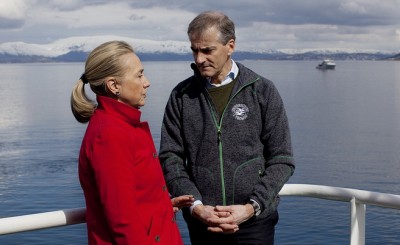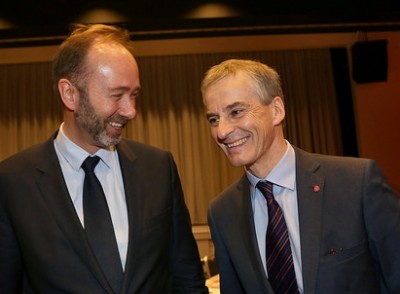The Norwegian Labour Party now officially supports Jonas Gahr Støre as its next leader. Støre said he made up his mind to take over as leader while sitting on top of the mountain known as Hallingskarvet, after first getting the go-ahead he needed from his family.

“It’s important for me to have a point in time to relate to (when making major decisions), and then I have a tradition for myself,” Støre told Norwegian Broadcasting (NRK). “I want to be alone on the top of a mountain. And on Friday during the Easter week, at the top of Hallingskarvet, I said to myself, with only me to listen, that the answer (to the question of whether he really wanted to lead Labour Party) was ‘yes.'”
Støre, age 53, has a long career at the highest political levels behind him already. He worked in the Office of the Prime Minister during Gro Harlem Brundtland’s administration but he only actually joined the Labour Party several years after that, in 1999. He’s also an atypical top Labour politician, coming from a wealthy family and growing up on Oslo’s affluent west side where he admitted he had no tradition for flying the flag on the May 1st Labour Day holiday. Last year, more radical trade union members made a lot of noise that Støre’s flag still wasn’t flying on May 1st. This year he made sure it was.

He’s known as an intellectual with impressive academic credentials from prestigious schools and a firm grasp of foreign languages, not least fluency in French. He’s best known as the long-time foreign minister for his predecessor as Labour leader, Jens Stoltenberg, who announced earlier this year that he’d be resigning to become the new secretary general of NATO. Støre as foreign minister and Stoltenberg as prime minister were the dynamic duo of the last left-center government that ruled from 2005 until they lost their second attempt at reelection last fall. Støre, who had gone on to become health minister at the time, consistently won wide respect abroad as well as at home, often scoring highest in public opinion poll evaluations of the various government ministers.
Now his looming position as Labour Party leader, due to be confirmed at the party’s extraordinary national meeting set for June 14, also makes him the party’s candidate for prime minister. Labour remains the largest single party in the country, with around 31 percent of the vote in recent polls, and if the current minority, Conservative-led government continues to anger voters as it has recently on issues ranging from abortion rights to the Dalai Lama’s visit to Norway, Støre could be propelled into the prime minister’s office at any time, not just after the next parliamentary election in 2017.

He knows he’s taking on a very tough job, even though this candidacy as Labour Party leader is the least contested in the party’s history. Støre enjoys broad support within his party, which still has its left- and right wings (Støre seems to adhere to the latter), but conflicts can break out at any time and the job can be all-consuming.
Støre thinks he’s prepared. “I’ve had some rounds of discussions with those closest to me, especially my wife, who’s the most important,” he told NRK, “because this is all about what kind of life I’ll be living.” The pressure is constant, the demands on his time unrelenting, and the job will affect more people than just himself.
He made it clear to the party’s election committee, though, that he wants to continue being a father, husband and family man, too. “When I started my career, we had small children,” Støre said. “Now I have elderly parents who need me. I don’t think I’ll be any better party leader if I give up that part of my life.”
Interestingly, with many of the current generation of Labour leaders in the same situation, the former labour minister for Labour, Anniken Huitfeldt, has proposed a major expansion of social welfare benefits in Norway that would provide paid leave to those needing to care for elderly parents, just like parents can get 20 paid days off a year to stay home with sick children. Labour introduced the right to unpaid leave to care for close family members but Huitfeldt thinks women feel most pressured to take it. “Now we must go further and give folks the same rights to care for parents or a spouse as they have for the children, at full pay,” she told newspaper Dagsavisen last week.
Making his mark
Labour veteran Martin Kolberg, who leads the party’s election committee, told NRK there was never any doubt who the committee wanted to lead Labour. In all his years with the party, he said he’d never experienced having a candidate who commanded such broad confidence as Støre. All 19 county chapters supported him in the voting.
He’ll take over Labour just before the summer holidays, and is expected to come back ready to challenge the conservative government coalition more vigorously than ever. Labour already has shown signs of behaving differently in opposition than it did while leading the government itself. Støre will likely bring more changes, since he does have some priorities and methods that are different than Stoltenberg’s.
He’s acutely aware that Stoltenberg is a hard act to follow, so hard that one of NRK’s most experienced news anchors accidently referred to Støre as Stoltenberg during Monday night’s national newscast while interviewing Støre live on camera. “I’m not an alternative to Jens Stoltenberg, though, I’m just myself,” Støre had told NRK earlier in the day. They share one major goal, though: “Our assignment is to seek government power.” Current Prime Minister Erna Solberg of the Conservatives has thus been duly warned.
newsinenglish.no/Nina Berglund

